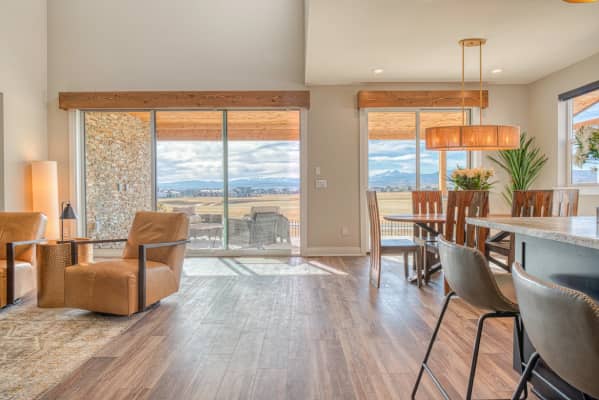Starting a residential construction project is an exciting journey, but it can also be overwhelming. Whether you’re building your dream home from scratch or undertaking a major renovation, the planning and execution process requires careful consideration. At Lefort Built Construction Company, we believe that a successful construction project is rooted in preparation, clear communication, and a well-structured plan. In this blog, we’ll walk you through everything you need to know before beginning your residential construction project, including important dos, don’ts, and key things to look out for.

1. Set a Realistic Budget
Do: Establish a clear, detailed budget and account for all costs.
When planning a construction project, budgeting is critical. Start by breaking down costs for materials, labor, permits, and unexpected contingencies. A well-thought-out budget will help you stay on track and avoid overspending. It’s essential to include a 10-20% contingency fund for unforeseen expenses that often arise during the build.
Don’t: Underestimate costs.
Be realistic about the prices of materials, labor, and the scope of your project. Costs can quickly escalate, especially if the project is larger or more complex than originally planned. Don’t cut corners to save money, as it can lead to problems later on, both financially and in terms of quality.
2. Choose the Right Team
Do: Hire experienced professionals for the job.
Your choice of contractors, designers, and architects will play a crucial role in the success of your project. Choose a reputable contractor, like Lefort Built Construction Company, with a proven track record of completing projects on time and within budget. Ensure your team understands your vision, works well together, and has the technical skills necessary to execute your plan.
Don’t: Hire based solely on price.
While it might be tempting to go for the cheapest option, it can lead to issues down the road, such as poor workmanship or delays. A skilled team that charges a fair price will save you money in the long run by delivering a high-quality build. Look for reviews, testimonials, and previous projects to ensure they have the experience and expertise you need.
3. Understand the Permits and Regulations
Do: Research zoning laws and building codes.
Before you start any construction work, make sure you’re fully aware of local zoning laws, building codes, and permit requirements. Your construction team should be familiar with these regulations, but it’s always good to double-check with your local authorities to ensure everything is in order. This will prevent costly delays or potential legal issues down the line.
Don’t: Skip the permit process.
Building without the required permits can result in fines, delays, and even having to tear down work that’s already been completed. Always ensure that you have the necessary permits before breaking ground.
4. Plan for the Unexpected
Do: Have a contingency plan.
No matter how well you plan, unexpected issues are bound to arise. Whether it’s weather delays, material shortages, or changes in building regulations, it’s important to be flexible and plan for the unexpected. This is where having a contingency fund comes in handy.
Don’t: Ignore potential challenges.
Ignoring possible risks or hoping that everything will go smoothly is a mistake. Properly preparing for potential challenges will allow you to navigate them more easily if they occur.
5. Stay Involved and Communicate
Do: Maintain open lines of communication with your contractor and team.
Clear communication is key to keeping your project on track. Make sure to set up regular meetings with your contractor to review progress and address any issues that arise. As a homeowner, you should stay involved and be accessible for questions or decisions, but also trust the expertise of your team.
Don’t: Micromanage the project.
While it’s important to stay involved, avoid micromanaging your contractors. You’ve hired them for their expertise, and they’ll need the freedom to do their job efficiently. Trusting your team to handle their responsibilities will lead to a smoother construction process.
6. Prioritize Quality Over Speed
Do: Focus on quality craftsmanship.
It can be tempting to rush through a construction project, but quality should always take precedence over speed. Good construction practices require attention to detail and time. Cutting corners to finish faster can result in long-term problems like structural issues or poor finishes.
Don’t: Compromise on essential aspects of the build.
Whether it’s the foundation, plumbing, or electrical systems, cutting corners on key elements of the build can have disastrous consequences. Always prioritize high standards, especially for critical aspects of your home’s structure and systems.
7. Plan for Future Needs
Do: Think about your long-term needs.
When designing your home, consider your future needs and how the space can evolve with you. Whether you’re planning for a growing family, a home office, or aging-in-place solutions, designing with the future in mind can save you money and hassle down the line.
Don’t: Overlook the potential for growth.
Building a home that only fits your immediate needs may leave you feeling cramped in a few years. By planning for the future, you can ensure that your home accommodates your lifestyle for years to come.
8. Be Prepared for Delays
Do: Set realistic timelines and be patient.
At Lefort Built Construction Company, we have a proven track record for sticking to schedules and delivering high-quality results on time. However, even with a highly efficient and experienced team, unforeseen delays can still happen. Whether it’s due to weather, material shortages, or changes in regulations, these factors can sometimes push timelines out of your control.
Don’t: Expect everything to be perfect from day one.
While we strive to stick to deadlines, construction is a dynamic process, and things might not always go according to plan. It’s important to be prepared for delays and approach the project with flexibility. Staying patient and realistic about timelines will help ensure the project runs smoothly and without unnecessary stress.
9. Understand the Return on Investment (ROI)
Do: Consider the equity you’ll build by upgrading your home.
One of the most important aspects of a residential construction project is understanding how the money you put into upgrading or adding onto your home can increase its value. Renovations and expansions often provide a great return on investment, helping to boost the equity of your property. Whether it’s a kitchen remodel, adding an extra room, or improving the curb appeal, these changes can raise the market value of your home.
Don’t: Overinvest in areas that won’t add significant value.
While upgrades can be a good investment, it’s essential to ensure the money you put into your home aligns with the potential return. Expensive luxury features in an area where they might not be in demand could mean you don’t see the full value back when selling your home. Be strategic with your investments, focusing on upgrades that offer long-term value.
At the end of the day, investing in your home can not only make your living space more comfortable and functional but also increase its value. If you plan smartly, your investment can even make you money when you decide to sell.
10. Inspect the Work Regularly
Do: Monitor progress and inspect the work at key stages.
Regular inspections at different stages of the project ensure that everything is being done correctly and according to plan. This can help identify any problems early, making them easier and cheaper to fix before they become bigger issues.
Don’t: Wait until the end of the project for a final inspection.
Waiting until the project is complete can lead to hidden problems that may be expensive to address. Inspecting periodically helps ensure the project stays on track and meets your expectations.
Conclusion
Starting a residential construction project is an exciting process, but it requires careful planning and attention to detail. By following these dos and don’ts, you’ll be well on your way to a successful build. At Lefort Built Construction Company, we understand the importance of getting every detail right. With the right team, budget, and planning, your dream home can become a reality. And remember, the money you invest in upgrading your home can almost always come back as equity, potentially making your investment work for you in the long run. If you’re ready to take the next step in your residential construction project, get in touch with Lefort Built Construction Company, and let us guide you through the process from start to finish.
